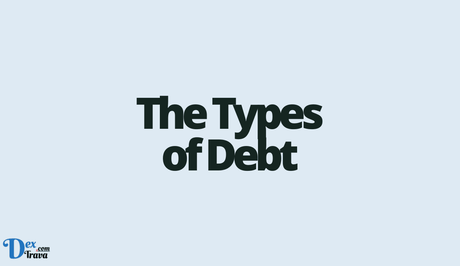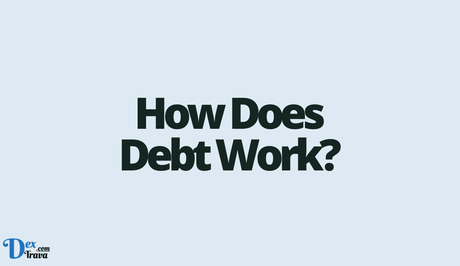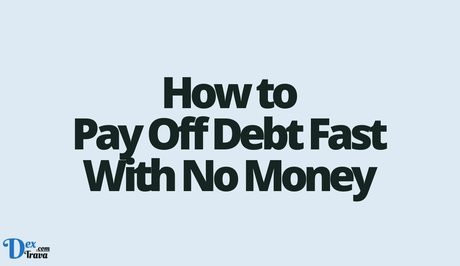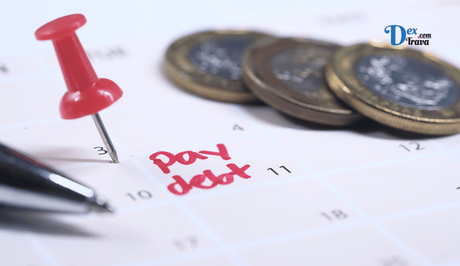In today's world, it's no secret that debt can pile up quickly, and it's not uncommon to find oneself in a situation where paying it off seems impossible. Fortunately, there are several ways to pay off debt fast, even if you don't have much money to work with. In this article, we'll explore some of the best strategies to pay off your debt fast with no money.
Debt is a term that is frequently used in the financial world, but not everyone understands its meaning. In its simplest definition, debt is an amount of money borrowed by an individual, business or government, that needs to be repaid in full with interest within a specified time frame. Debt is often seen as a negative thing, but it can also be a useful tool for achieving financial goals.
What is Debt?
A debt is an obligation to pay back money that has been borrowed from a lender. It is a contractual agreement between two parties, where the borrower agrees to repay the amount borrowed with interest, within a specified period. In most cases, debt is incurred when an individual or organization has insufficient funds to finance a particular project, purchase, or investment.
Debt can take on many different forms, such as personal loans, credit cards, mortgages, and government bonds. Regardless of the type, debts are legally binding agreements that require the borrower to repay the principal amount plus interest. Failure to repay the loan as agreed can result in legal action, which can lead to severe consequences such as wage garnishment, property seizure, or bankruptcy.
Also, See:
- How to Create a Budget Spreadsheet
- Invest in Stocks and Make Money Online
Types of Debts:

There are many different types of debts, each with its own unique characteristics. The most common types of debts are:
- Secured Debt: This type of debt is secured by collateral, which is an asset that the lender can seize if the borrower fails to repay the loan. Examples of secured debt include mortgages and auto loans.
- Unsecured Debt: This type of debt is not secured by collateral and is based solely on the borrower's creditworthiness. Examples of unsecured debt include credit cards and personal loans.
- Revolving Debt: This type of debt allows the borrower to borrow and repay the money over and over again, up to a pre-determined credit limit. Examples of revolving debt include credit cards and home equity lines of credit.
- Instalment Debt: This type of debt is repaid in fixed payments over a specified period. Examples of installment debt include mortgages and personal loans.
How Does Debt Work?

When a borrower needs money, they can approach a lender to borrow the required funds. The lender will evaluate the borrower's creditworthiness by looking at their credit history, income, and other factors. If the lender is satisfied with the borrower's ability to repay the loan, they will approve the loan and set the terms of repayment, including the interest rate, payment frequency, and duration of the loan.
Once the loan is approved, the borrower will receive the funds and will be required to repay the loan according to the agreed terms. Failure to make timely payments can result in late fees, penalties, and even legal action. It is essential for borrowers to understand the terms of the loan and to make every effort to repay the loan on time to avoid adverse consequences.
How to Pay Off Debt Fast With No Money

-
Assess your current financial situation
Before you start paying off debt, it's important to take a step back and assess your current financial situation. This means taking stock of all of your debts, including credit card balances, personal loans, student loans, and any other debts you may have.
Once you've made a list of all of your debts, you'll need to prioritize which ones to pay off first. Typically, you'll want to focus on paying off high-interest debts first, as these will cost you the most in interest over time.
-
Create a budget
Once you have a clear picture of your debts, it's time to create a budget. This means making a list of all of your monthly expenses, including rent/mortgage, utilities, groceries, transportation costs, and any other bills you may have.
Once you have a list of your monthly expenses, subtract this total from your monthly income. This will give you a clear picture of how much money you have left over each month to put towards paying off your debts.
-
Cut expenses
If you're serious about paying off debt quickly, you'll likely need to cut expenses. This means making some tough choices about where to cut back on spending.
Some potential areas to cut back on include eating out, entertainment expenses, and subscription services. You may also want to consider downsizing your home or car to save on monthly expenses.
-
Increase your income
If cutting expenses isn't enough to make a dent in your debt, you may need to find ways to increase your income. This could mean taking on a second job, freelancing, or selling items you no longer need.
While increasing your income may not be easy, it can be a powerful way to pay off debt quickly.
-
Consider debt consolidation
If you have multiple debts with high-interest rates, consolidating them into a single loan with a lower interest rate can be a smart move. This can make it easier to manage your debt and can save you money in the long run.
There are several ways to consolidate debt, including taking out a personal loan or using a balance transfer credit card. It's important to weigh the pros and cons of each option and choose the one that makes the most sense for your situation.
-
Negotiate with creditors
If you're struggling to make your monthly payments, it may be worth reaching out to your creditors to see if they're willing to negotiate. This could mean asking for a lower interest rate or setting up a payment plan that works better for your budget.
While not all creditors will be willing to negotiate, it never hurts to ask. And if you can negotiate a better deal, it can be a powerful way to pay off debt quickly.
-
Use the snowball method
Finally, one of the most effective ways to pay off debt quickly is to use the snowball method. This means focusing on paying off your smallest debts first, then moving on to larger debts as you go.
By paying off your smallest debts first, you'll get a quick win that can help motivate you to keep going. And as you pay off each debt, you'll have more money available to put towards your larger debts.

Conclusion
Debt can be a useful tool for achieving financial goals, but it can also be a source of financial stress if not managed properly. Paying off debt fast with no money may seem like an impossible task, but it's far from it. By assessing your current financial situation, creating a budget, and cutting expenses, you can easily pay off your debts quickly.
Similar posts:
- How to Pay Off Debt Fast With Low Income
- 11 Ways to Save Money Fast on a Low Income
- Everything You Need to Know Before Taking Out a Home Equity Loan
- How to Pay Off Your Credit Card Debt
- Debt Consolidation, Management, Settlement, Bankruptcy: Which is best?
